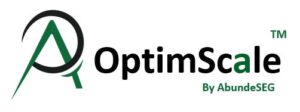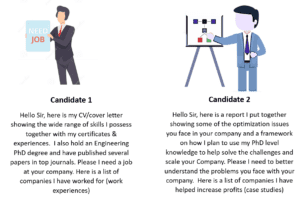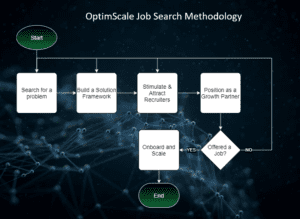Getting a High-Paying Industry Job is difficult and launching a business is even more difficult: Engineering PhDs now use the OptimScale Job Market Formula.
By Fabrice Abunde (ScientistMBA, PhD)

When you graduate from the university and earn an Engineering PhD degree, you are told to follow one of three-possible tracks in your career.
- Stay in academia and one day become a tenured professor.
- Apply for an industry job where you can gain first hand industry experience.
- Launch a company from your research discovery.
To apply for a job (industry or tenure professorship), you are advised to:
- Get a list of companies/universities you are interested to work with
- Subscribe to job listing websites,
- Prepare a good CV and cover letter.
- Join LinkedIn or ResearchGate to build a professional network
- Start submitting your CV and cover letter to application portals while building your professional network.
To start a business, you are told to
- Come out with a business idea from your research project.
- Write a business plan on how to implement your idea.
- Apply to funding agencies or pitch your idea to investors.
In some cases (rarely), your university department and/or family helps you raise some start up cash.
This is the structure that was created back before the Covid-19 Pandemic (Pre-Covid employability concept). Back then, it was a phenomenal concept!
All graduates had to do was:
- Prepare a good CV and cover letter and submit to as many job openings as possible and you end up getting several as high paying job openings to choose from.
or
- Write an attractive business plan and submit to funding agencies to end up raising huge funding to start a business.
That’s the exact same structure we follow today. Meanwhile we are now in the era of Covid Pandemic.
80% of jobs posted online are already occupied.
In today’s Job market, 80% of jobs posted online are already occupied. Of the remaining 20%, they are obtained through networking and referrals. Using this frustration, some Engineering PhDs try to launch a company from their research discovery but since only 10% of startups do succeed, they end up in the failure zone.
Others stay in academia and continue the low-pay theoretical research and teaching without any practical application of their engineering skills.
In summary, getting a job is difficult and starting a business is even more difficult especially in the era of covid-19 pandemic. The proof is that over 75% Engineering PhDs remain unemployed or underpaid at some point in their career.
Who is this Article For?
Now if you are an Engineering PhD, you must have experienced one of the following situations:
- You will send several CVs to several job applications but don’t even get a response from recruiters. The reason is because large companies now recruit consultants to standardize their processes such that they can be executed by bachelor and high school graduates at a lesser pay. So, if you search for jobs in the traditional way, you will either face competition from bachelor and high school graduates or be underpaid compared to your knowledge level.
- You apply to lecture at a university, but they want to give you a part-time instead of a full-time position. Tenure professorships are at an all-time low. Full-time lecturing positions are being replaced by low-paying part-time jobs.
- You apply to funding agencies but always get a rejection with your project idea. Today, only 5% of funding is available for start-ups and 95% for expansion. This means your research idea must be making money before you can easily get funding to expand.
In summary, getting a job is difficult and starting a business is even more difficult especially in the era of covid-19 pandemic. The proof is that over 75% of Engineering PhDs remain unemployed or underpaid at some point in their career. 80% of new businesses fail for no market need.
What then must Engineering PhDs have to do in order to succeed? What are you doing wrong that is preventing you from getting your dream career?
That’s what I’m talking about.
Society has been FEEDING you the idea that you can become financially successful with a concept from the industrial expansion age mean while we at the information expansion age
This article is for postgraduates who fall under any of the following categories:
Whether you’re:
- A recent Engineering PhD Graduate with no work experience searching for a high-paying industry job; or
- An Engineering PhD Professional wanting to turn your routine and low paying industry job into a high-paying consultancy firm; or
- An Engineering PhD Entrepreneur wanting to launch a B2B startup from your research discovery and/or scale it to a hyper profitable multi-million-dollar company even without having any external funding,
The article will help you see everything in the industry job market with a new perspective, which in turn will better prepare you to position yourself in the job market and avoid the errors you make that prevents you from getting a high-paying industry job.
The Big Idea about the Job Market Formula


First, here’s the truth … you can get a high-ticket industry job where you enjoy an extremely high salary, a flexible work schedule and feel fulfilled because you apply your PhD level knowledge to work on innovative industry projects that generate significant amount of profits.
However, there has been no framework to help Engineering PhDs do so.
The big idea is this… High-Paying PhD Level Jobs are not gotten in the same way as low/average paying regular jobs.
While a low/average paying job is about the employee working for an employer who serves a client, a High-Paying Jobs is rather about an employee working for both an employer and a client. Put in another way, it’s about partnership between the employer and the employee to better serve the Client in a way that increases profits for the employer. Both the employer and the employee must understand the problems faced by the client.
So, Engineering PhDs fail to get high-paying industry jobs not because they aren’t good at what they do but because they don’t understand the new Job Market Formula.
This leads to three fundamental changes:
- Instead of searching for jobs by companies you’re interested in, you rather search for problems faced by these companies, which affects their profits.
- Instead of preparing job application package (CVs & Cover letters) based on job postings, you rather prepare a Framework based on your skills targeted towards solving a problem faced by the employer.
- Instead of applying by uploading documents to application portals, you need to come in contact and sign partnership deals with key decision makers of the company.
If you want to get a high-paying Industry Job, where you earn between $200k to S1M per year, you must understand this fundamental change in concept as well as the right approach to implement this New Concept at every state of your job search process. These are the secrets I will be showing you in this article.
How I Discovered the Growth Optimization Potential
For those of you who don’t know me, my name is Fabrice Abunde (PhD), an Engineering PhD like you. A few years ago, I wanted to get a highly paid industry job, where I can apply my PhD engineering skills and/or research discovery to solve practical business/industry challenges.
I looked everywhere for a strategy on how to do this, but I found nothing other than a few books & articles on CV writing, cover letters, interviewing, job search, etc., which could only land me average pay routine jobs, where I do the same work as Bachelor and Master’s degree holders.
I decided to take matters into my own hands and run a series of experiments to find the best strategies that could help an engineering PhD like me earn tens of millions by translating my academic knowledge into industry financials. Then I discovered the OptimScale Job Market Formula, which I can use to access high-ticket industry jobs and show recruiters how my Engineering PhD can help their company scale.
My strategy worked so well, that I now earn 4 times the pay of average Engineering PhDs by working with different companies to help them scale. First, within 3 months working with a water Tech Group, I brought in over $100k.
I went on to scale 2 other companies within 12 months: one in the developed world to over $1M in Annual Recurrent Revenue and one in developing world to over $250k all while being hilariously profitable.
The Hidden Job Market Data That Showed Me Why All Engineering PhDs need a New Job Market Formula
When I left academia and started gaining experience in the business and industry world, I always asked myself this key question…
What would it take to be a financially free MILLIONAIRE one day?
As a PhD, I answered this question the way PhDs answer all questions…
By doing some research.
What I found REALLY surprised me…
Working for an employer will never make me a million-dollar producer. Most millionaires are entrepreneurs. But there was a big problem… only 1 out of 10 new startup entrepreneurs become successful. So, I knew taking the route of an entrepreneur would be a very risky and tedious one.
I continued to ask myself, could there be another career path where one could easily become a millionaire without starting a company? After digging into more data, I was able to synthesize and create a formula, which I call the Job Market Formula (Figure 1).


The Job Market Formula shows that in every job market:
- 3% of recruiters know they have a job vacancy (company problem to be solved), want to hire a candidate, know the job specifications (solution steps) and are currently ready to hire a candidate.
- 17% of recruiters know they have a job vacancy (company problem to be solved), want to hire a candidate, know the job specifications (solution steps) but are still gathering information on the quality of candidate to hire.
- 20% of recruiters know they have a job vacancy (company problem to be solved), want to hire a candidate, but have no knowledge about the job specification (solution steps) or the quality of candidate to hire.
- 25% of recruiters know they have a job vacancy (company problem to be solved), but neither want to hire a candidate nor have knowledge about the job specification (solution steps)
- 35% of recruiters are completely unaware if they have a job vacancy (company problem to be solved) or the job specification (solution steps).
This means all the job postings we see out there including those gotten through referrals fall under the 3 % of recruiters who are currently hiring.
For the jobs where recruiters know about the job description (level 1 and 2 companies), the salary and work schedule are often predefined. Most at times you are paid for your time and skills you invest in execution of the job.
For the other 80% of jobs where the recruiter has no knowledge about the job specification, the salary is flexible, and you are mostly paid for results and not for time. The earnings can be infinite depending on the results you bring to the company.
It is this 80% of jobs that can push you to the million-dollar mark. For these jobs you work with the employer and not for the employer reason why these jobs are never seen in the job market.
These jobs require research, and innovation skills, to first identify the problem (job vacancy) as well as the solution steps (job specification) which are all skills Engineering PhDs Posses. But how do we get such jobs, was the next challenge I had.
You see, I could find snippets of information online but wherever I looked, I couldn’t find a cohesive body of knowledge that could help me access the 80% of industry jobs where I work with recruiters and get highly paid for the results I bring and not for the time I work or tasks I execute.
How to Access the Hidden 80% of High Paying Industry Jobs for Engineering PhDs
To identify the 80% of jobs, you make use of the following three step process known as the OptimScale Spearing Method.
Step 1: Search
You choose an industry Niche and search for all the companies you are interested in within that Niche in a particular geographical location. You can search via google or using the LinkedIn Sales Navigator.
For Each company, identify a contact person, his/her email address, and phone contact. Sometimes, you might need to make use of tools such as Seamless.ai to scrape the email address and contact details of the contact people you choose in these companies.
Record your results on a Job Search Spreadsheet. Search and record at least 30 companies on the Job Search Spreadsheet. If you choose the biotech Niche for example, then the google search phrase can be ‘Small-scale biotech companies in Miami’. If you use the LinkedIn Sales Navigator, you can have more parameters to filter your search. For startups, the contact person should be the CEO, Founder or Co-Founders.
For Large companies, the contact person should mostly be the R&D Manager or Innovation Manager. Sometimes, it can be the VP of Sales or VP of Marketing.


Step 2: Research
Now you need to do your homework about the company. You need to research and identify all the main optimization problems that the company faces that is preventing them from scaling. We mostly research problems that affect profits. Research info can be obtained from the website or LinkedIn profile.
Then you prepare a framework and a PDF report outlining the issues you identified as well as the steps (job description) on how you plan to solve the problem. Also, do an ROI justification spreadsheet calculation to show how solving the problem will help the company improve profits. Finally, do a short 2-5min video explaining your research results.
Step 3: Connect
Send Personalized Message via Email outlining the results of the research in the body of the mail. Also attach the PDF report, video recording as well as the ROI Justification Spreadsheet.
At the end of the message, request for a 1-hour meet (either virtual or in person) to further discuss the optimization issues faced by the company.
Afterwards, send a connection request to the contact person on LinkedIn. If prospect connects, refer to the email you sent. If the person doesn’t connect or respond to the email after 3 days, send a reminder.
Do about 3 to 4 reminders and you should get a response. When you get a response, and a 1-hour meet, carefully explain the details of your research and use a spreadsheet to show how the company will growth in profits by working with you.
When you use the problem-search approach, you identify unique opportunities void of competition. Companies don’t post their problems to job sites, so when you identify problems, you are already far ahead to getting a job. You access 80% of the jobs that are never available in job postings.
The Bottomline
So, instead of searching/asking for job openings, rather search for problems that are faced by the companies you are interested in. Every company wants to scale and increase profits by either increasing revenue or reducing cost. So, identify problems that when solved will allow these companies scale in profits.
Also, when you identify company scaling problems, it has no salary attached to it. You can earn as high as possible depending on the level to which you help the company scale.
For instance, if you solve a scaling problem that earns a company $10M they will happily pay you $1M. Also, by searching for problems, you access the 80% of jobs from recruiters that are neither ready to hire nor still gathering information as shown on the Job Market Formula


How to Get Started
There are a couple of ways you can achieve this…
Option 1: You do it yourself.
Option one is to follow the 3 steps to getting a high-ticket job by yourself and take the time to learn everything I have shown you. However:
- You will find it difficult to identify the right industry problem, which when solved will help the company scale to the millions. If the problem is wrongly identified, all the other steps will be irrelevant.
- It will take you so much time and many trials and errors to prepare the right PDF report and ROI justification that will convince the companies to pay you a huge salary. This might end up frustrating you to giving up and returning to your old ways.
I know as engineering PhDs we are tough and can easily learn things faster. But if you try to research online, you’ll only find snippets of information. You can’t find a cohesive body of knowledge that can help you achieve this.
This means you might have to devote months or even years of research to be able to figure out everything by yourself. So, it’s possible trying to do it yourself but it will be painful, costly and time consuming.
Now because you have read this article up to this point, I know you are an Engineering PhD who really wants to succeed. So, I will provide you two other options to help you get started.
Option 2: Watch full training video here and take a quiz.
I have prepared a 2-hour free training video for you on how Engineering PhDs can use the Job Search Thesis to get jobs that pay 200k to 1M per year. The Job search thesis is part of my proprietary OptimScale Job Search Methodology exclusive for Engineering PhDs.
Option 3: Book a Free Industry Strategy Call here and talk to a Growth Specialist
On this call, I will help you figure out where you are now in terms of your industry job search and the steps you need to take to get a high-ticket industry job where you earn between $200k to $1M per year while enjoying a flexible work schedule and feeling fulfilled because you apply your PhD level knowledge or research discovery to help companies scale to significant profits.
Benefits of using the Job Market Formula
“Here’s what is going to happen when you use the Job Search Thesis:
- Zero competition: you access jobs that are not available via job postings or network referrals. Also, because no one is using the problem-based approach to search for jobs, you stand out in the job market.
- You’ll gain Industry Authority as a Growth PhD because recruiters see you as a partner in growth and not just a candidate looking for a job and salary to earn a living.
- You significantly increase the rate at which you get hired and the salary you command. Now your salary becomes largely irrelevant to recruiters because they want you for value.
- You get jobs that match your skill level. The dream of every Engineering PhD is to see how their unique technical skills is directly applied to help industries create wealth and contribute to economic development.
Proofs to show that the Job Search Thesis Really Works
The Job search thesis is part of my proprietary OptimScale Job Search Methodology exclusive for Engineering PhDs. Using this methodology, I now earn 4 times the pay of Engineering PhDs by working with different companies to help them scale.
First, within 3 months working with a water Tech Group, I brought in over $100k.
I went on to scale 2 other companies within 12 months: one in the developed world to over $1M in Annual Recurrent Revenue and one in developing world to over $250k all while being hilariously profitable.
Also, don’t just take me for my word. OptimScale is built on my proprietary modeling framework for system scale up that been vetted and recognized by some of the world’s greatest publishers and news agencies such as:


Also, others have made use of the same 4-step approach to earning millions of dollars by helping startups scale.
- Professor Steve Blank (USA) who scaled 8 startups to the billions of dollars,
- Russell Brunson (USA), worked with over 30,000 startups to help them scale to the millions.
- Sabri Suby (Australia) who generated over $1.33 billion scaling thousands of startups in over 215 different niches,
- Nick Kozmin (Canada) repeatedly scaled over 2000 tech startups to the millions,
And the list goes on……
If you need help on how to use your academic knowledge or research discovery to get a highly paid industry job, where you earn between $200k to $1M per year by using the New Process Modeling and the Scientific Scaling Method (OptimScale) to Help Companies Scale, even if you have No Industry Experience, then watch full training video here or book an Industry Strategy call here to talk with me or one of our growth specialists.
For Engineering PhDs:


Hi, I'm Fabrice Abunde, PhD
After 7 years of research, I discovered the OptimScale Methodology, that helps Engineering Masters/PhDs Earn between $200k to $1M per year using Process Modeling and the Scientific Scaling Method to Help Companies Scale, Even if you have no Industry Experience.
If you want a highly-paid industry job or consulting project where you apply your academic knowledge or research discovery to help industries grow, watch full training video on how to use OptimScale Method in doing so.
About the Author: Fabrice Abunde, PhD


Fabrice Abunde


re are the most common results you'll get if you are trained and certified in the OptimScale Methodology. Here are the most common results you'll get if you are trained and certified in the OptimScale Methodology. Here are the most common r
re are the most common results you'll get if you are trained and certified in the OptimScale Methodology. Here are the most common results you'll get if you are trained and certified in the OptimScale Methodology. Here are the most common r
re are the most common results you'll get if you are trained and certified in the OptimScale Methodology. Here are the most common results you'll get if you are trained and certified in the OptimScale Methodology. Here are the most common r
re are the most common results you'll get if you are trained and certified in the OptimScale Methodology. Here are the most common results you'll get if you are trained and certified in the OptimScale Methodology. Here are the most common r
Similar Articles for you






2 Reasons why using A CV/Resume Is Rather Killing your Industry Job Search: Engineering PhDs now use the Job Search Thesis to Get Hilariously High-Paying Jobs.
By Fabrice Abunde (PhD)
Engineering PhDs end up unemployed, underpaid or trapped in routine average pay industry jobs not because they aren’t good at what they do, but because they use the wrong approach and assets to search & apply for jobs.
As an Engineering PhD you can’t search & apply for an industry job the same way regular job candidates do. Getting a highly paid industry job at the PhD Level is not about having the best CV/Resume but about having a Job Search Concept that will differentiate you from other candidates in the job market and help recruiters see you as a partner in growth and not simply a candidate searching for a job and salary to survive.






How I discovered the OptimScale Job Search Methodology that can help any Engineering PhD Transition to Industry and earn $200k to $1M per year
By Fabrice Abunde (PhD)
Consequently, Engineering PhDs end up underpaid in academia, unemployed or trapped in routine average pay industry jobs not because they aren’t good at what they do, but because they search, apply, and execute jobs, using the wrong approach and lack a Framework to translate their academic knowledge into measurable financial results for companies.
I realized that instead of starting a company or searching for a job to work for companies, Engineering PhDs can now use the OptimScale Methodology to pair with startups, apply modeling, simulation, and optimization Framework to scale the startups to Millions-Dollar companies and earn a percentage of revenue.
Get the OptimScale white paper for Free.
Step-by-step guide on how to make $200k to 1M per year using the Process Modeling
and the Scientific Scaling Method to help Companies Grow.
Join other Engineering PhDs
Become a Respected and Highly-Paid Industry Consultant. Learn How to Apply the New Process Modeling and the Scientific Scaling Method to help Companies Grow
Copyright 2023 AbundeSEG. All rights reserved

